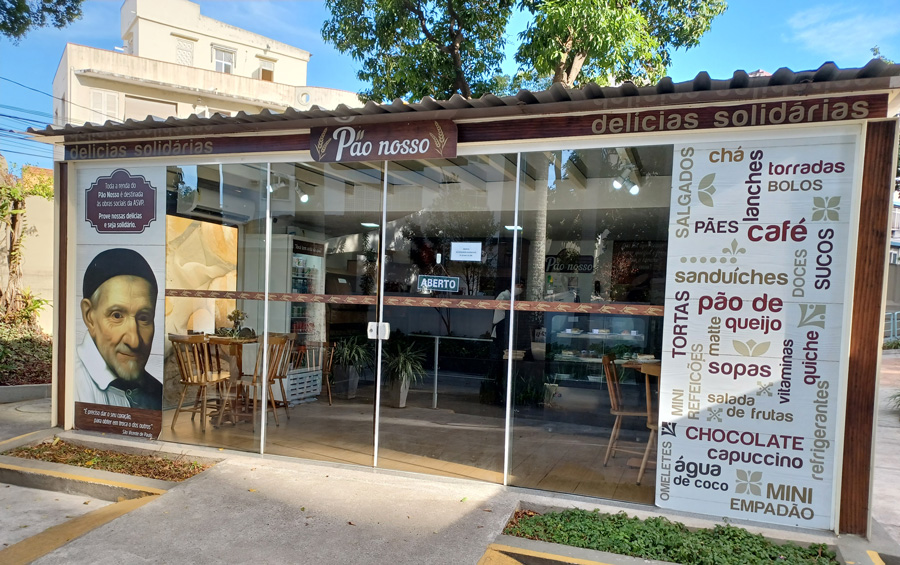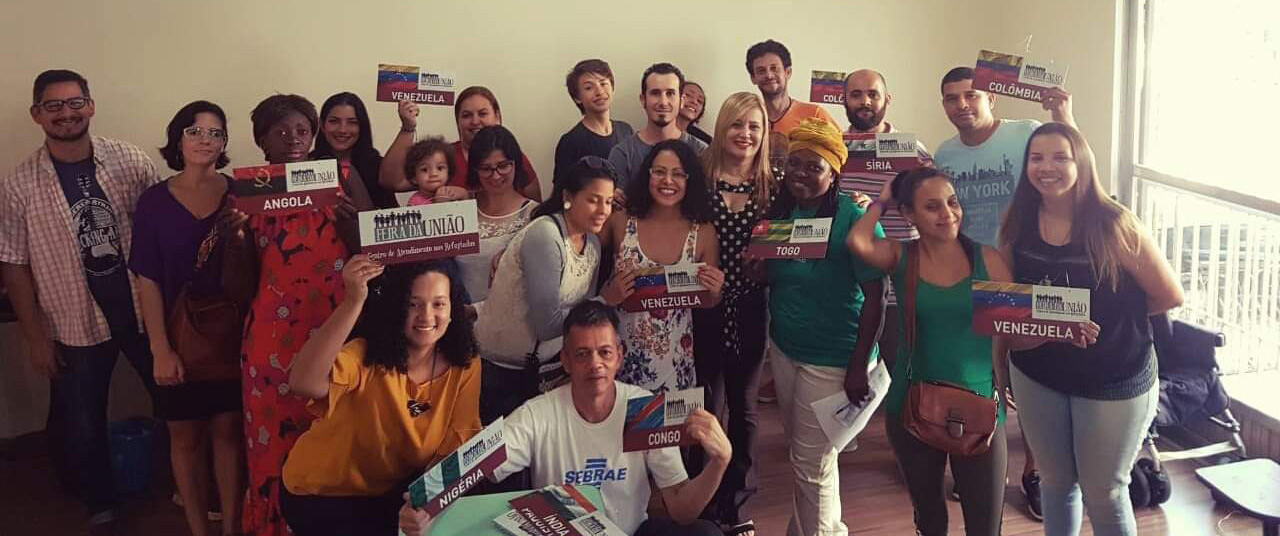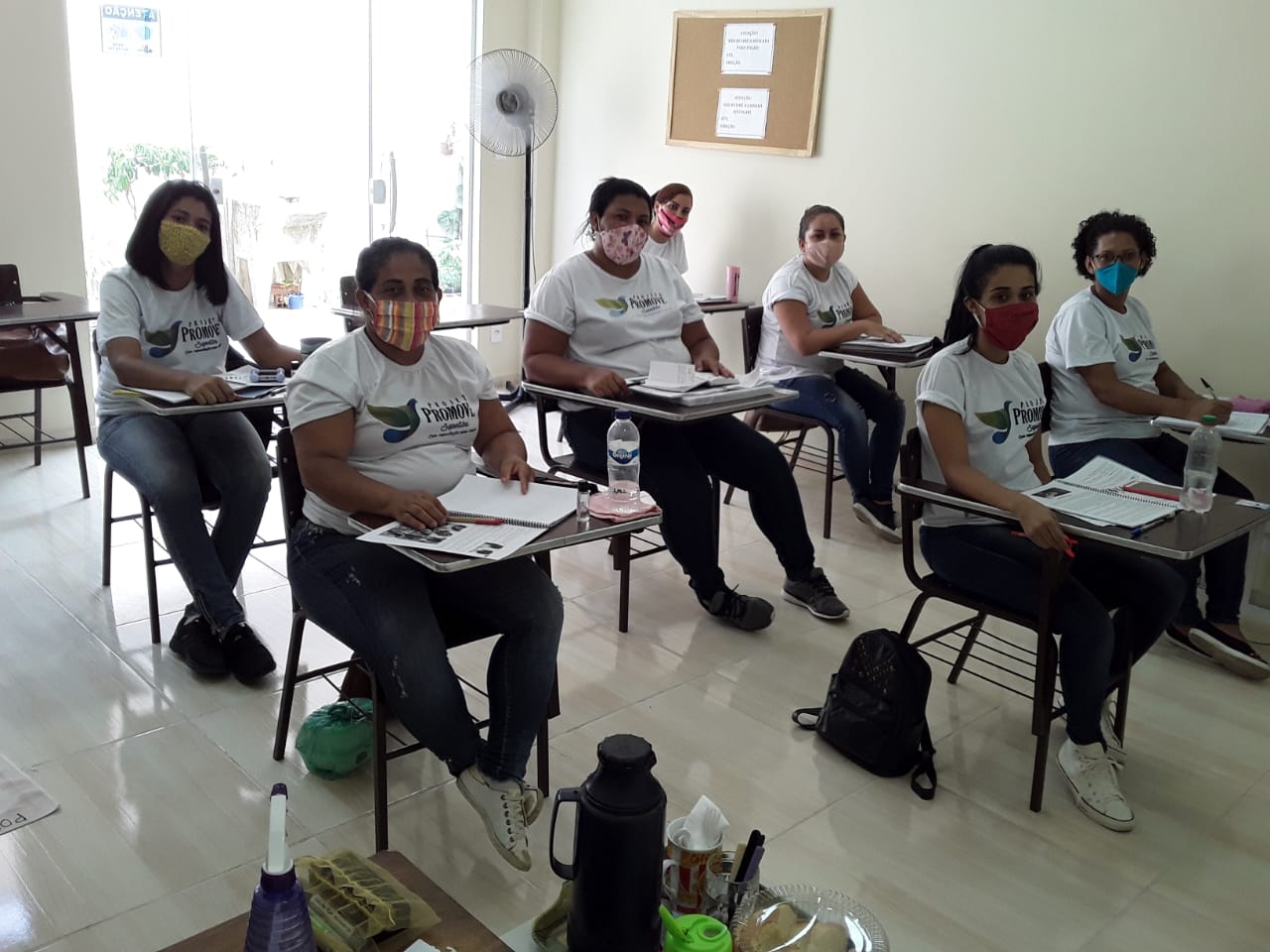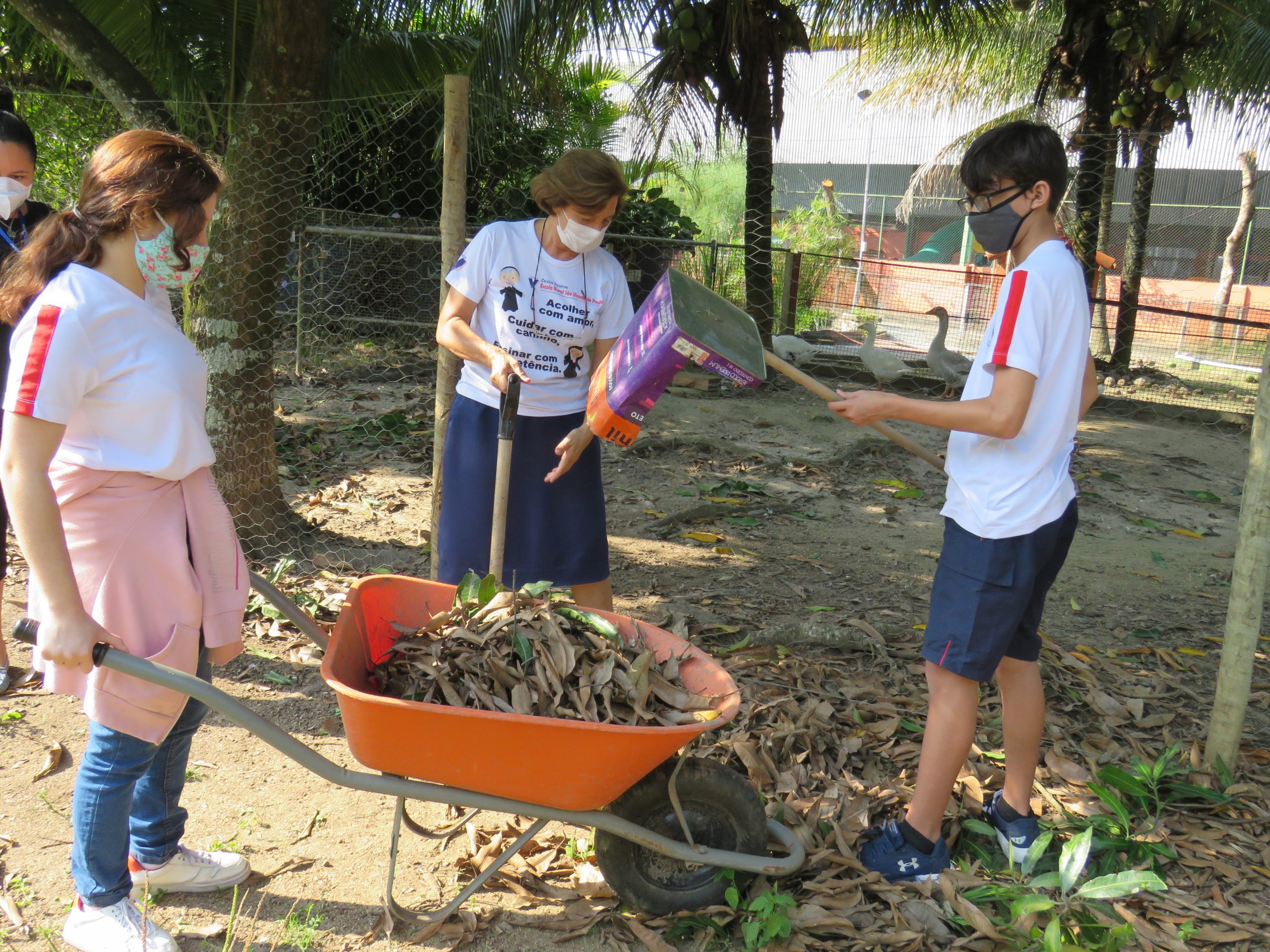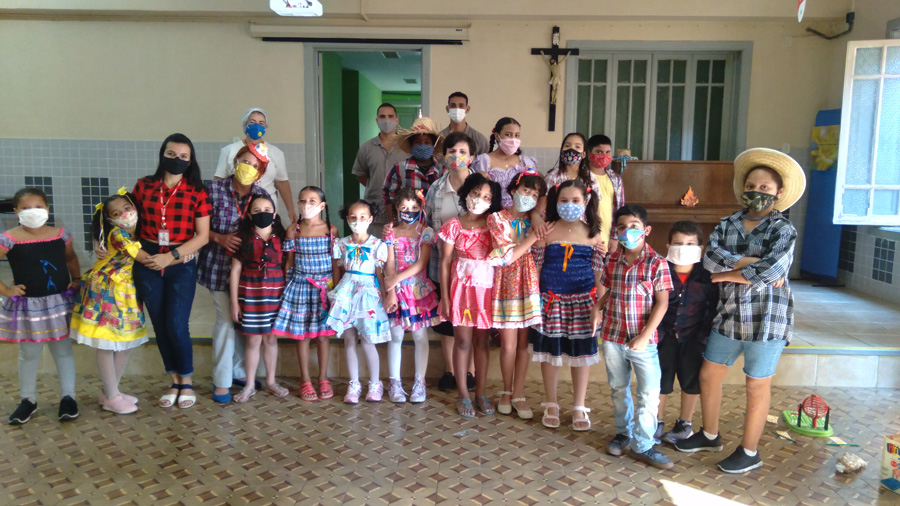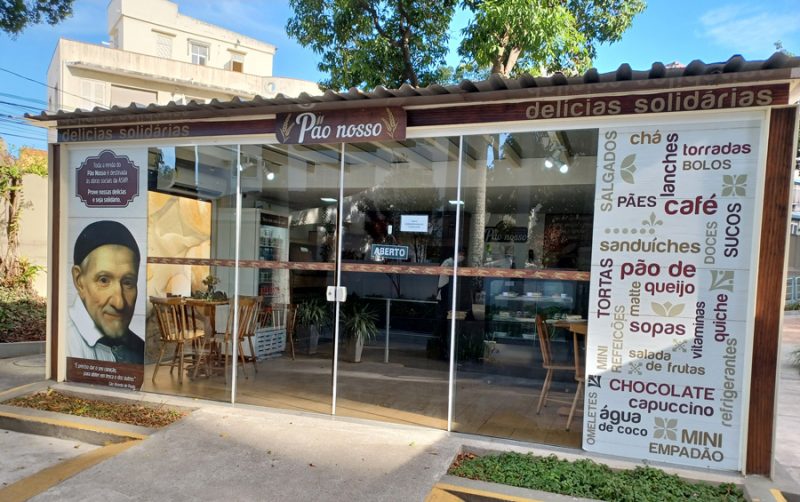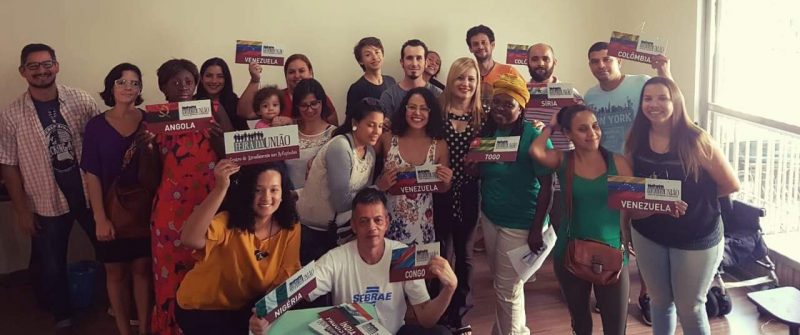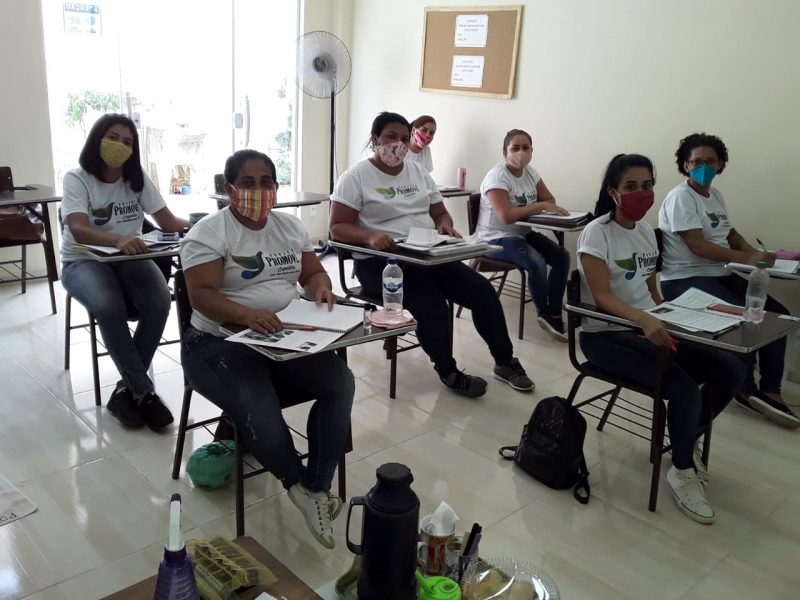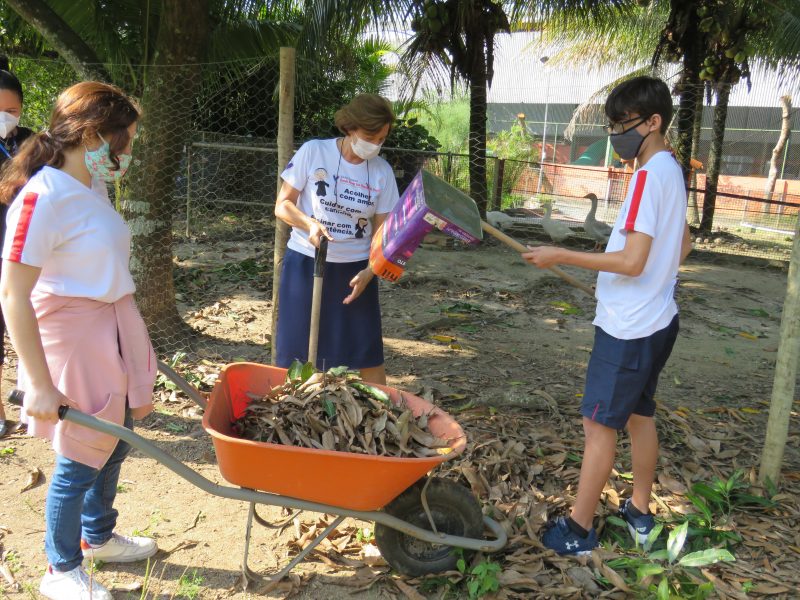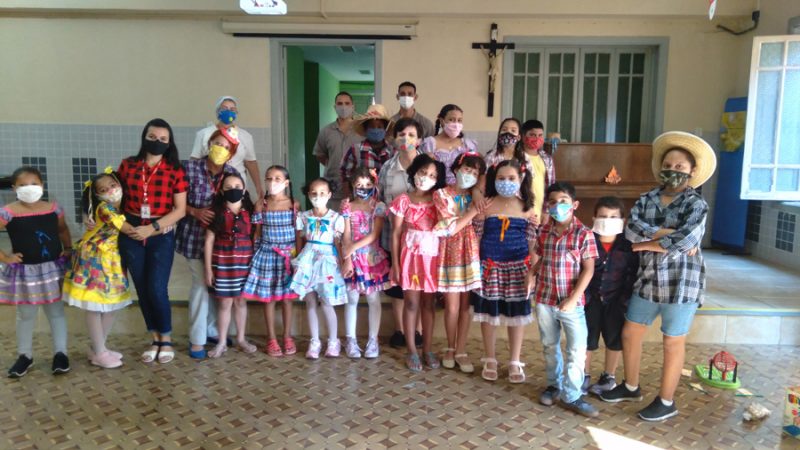Social Responsibility is any and all action that could contribute to improve the quality of life and for the sustainable development of peoples). The Company of the Daughters of Charity of Saint Vincent de Paul adopts Social Responsibility criteria in its management, developing activities that enable the formation of citizens who are aware of their social role.
Bakery and Cafeteria Our Bread
Inaugurated in November 2019 in the Provincial House complex in Tijuca) the Bakery and Cafeteria Our Bread-solidary delicious, were created with (the purpose of raising funds through the sale of products for the maintenance of the Social Projects of the Daughters of Charity Company. Thus, cutting costs with the purchase of breads, cakes and cookies produced by third parties to supply the Saint Vincent de Paul Hospital and the house of the elderly sisters, the bakery began to produce for domestic consumption.
The bakery also accepts orders for breads, sweets, snacks and meals for parties and events. It is also where all the production that is sold in the cafeteria comes from.
The cafeteria offers a pleasant environment with quality products and excellent service. In its menu there are assorted bread, cakes, pies, snacks, meals, soups, sandwiches, coffee, tea, juices, sodas and much more.
The space is open to the public and attends especially visitors of the Miraculous Medal Shrine, patient companions and the staff of the Saint Vincent de Paul hospital
Working Hours: Monday to Saturday, from 7am to 7pm
Sundays and Holidays, from 8am to 4pm
Phone: +55 (21) 2563-9477
Address: Rua Dr. Satamini, 333, Tijuca
Social networks:
The Refugee Care Center (RJ)
Following the Vincentian’s Order Charism of helping the poor and the suffering, this project was created in 2019 to shelter and give support to individuals seeking refugee) in Brazil.
The Refugee Care Center is located in Botafogo neighbourhood, in the south of Rio de Janeiro city, and meets the most diverse demands from migrants and refugees, such as legal, psychological and social service, the teaching of Portuguese language, guidance for health service in UPAs, Family Clinics and public hospitals in general, insertion in popular aid projects as a “My House, My Life”, and also training for the job market, among others.
The project also offers space for craft fair, realized fortnightly every two weeks, hence providing a source of family income, besides an opportunity to for socialization and dissemination of the culture of each country.
Service: Monday to Friday – from 10am to 4pm
Phones: +55 (21) 2551-1448 | +55 (21) 99694-2388
E-mail: social.refugiados@asvp.org.br
Address: Rua Muniz Barreto, 100, Botafogo
Social networks:
Promove Sepetiba
The Promove Sepetiba Project was created with a view to improve the quality of life and encouragement of the individuals and collective potentialities of the population of Sepetiba region, in the west zone of Rio de Janeiro city. The focus is the professional training, income generation and entrepreneurship, with the realization of beauty workshop at popular prices and whose income is reserved to the maintenance of the project. Among the courses offered, there are: hairdressing, manicure, make up, hair braiding, eyebrow designer and barber.
The project began in 2015 and was reformulated in 2019.Besides the beauty workshop, Promove has signed a partnership with Volunteer Professionals, enabling the community of Sepetiba and surroundings of pré-vestibular courses (course that prepares a student to a Test for university admission, and free legal and psychological services.
Service: From Monday to Friday – From 8am to 5pm
Phone: +55 (21) 3292-3376
E-mail: promove.sepetiba@asvp.org.br
Address: Praia de Sepetiba, 1630, Sepetiba
Social networks:
Sustainable Life Project
Spreading sustainability is essential to improve the quality of life. In this regard, the goal of this project is to encourage sustainable actions to implement a culture of environmental preservation and contemplate the pedagogical propose to an environment awareness. The idea here is to collectively build social values, knowledge, skills, attitudes and competencies, focused on conservation of the environment. Among the outstanding initiatives there are: the Medicinal Gardens and Little Farm, both located in the Rural School of Saint Vincent de Paul, in Guaratiba.
Medicinal Gardens
Developed in a partnership with Fiocruz, The Federal University of Rio de Janeiro (UFRJ), the University Veiga de Almeida, Brazilian Health System (SUS) and Child’s Pastoral Care, the Medicinal Garden aims to expand the health concept through education. It is established in the grounds of Rural School Vincent de Paul, in the west zone of Rio de Janeiro, the Garden of Medicinal Plants is a true “living pharmacy”. It gathers great variety of native species, relevant to the mild diseases prevalent in the community.
In 2020, for the implementation of the garden, contact was initiated with the Basic Health Unit of the region, in order to ensure the participation of the medical team in the project.) From there, the epidemiological profile of Guaratiba’s population was identified and the medicinal plants to be cultivated were listed. Also, there were joint task forces to plant the garden. Developed and preserved by students, this community garden integrates the young people and their families in collective activities.
Among the project’s tasks are also the training of the cooperative and the Rural School, making medicine plant seeds available to be cultivated in family farm, the promotion of teaching at adult and child levels, the practice of agro-ecology, in addition to teaching basic concepts of phytotherapy (herbal medicine) as referred in the National Form of Pharmacopeia of ANVISA, always approaching the Scientific Basis. The project ensures knowledge of harvest, primary processing, storage, quality control, dispensing and prescription, according to the current legislation.
The use of medicinal plants was recommended by the Brazilian Government in 2006 with the National Program of Medicinal Plants and Herbal Medicines (Ministry of Health decree 5.813.2006) that aims to guarantee to the Brazilian population a safe access to and the rational use of the medicinal herbs and of medicinal plants and herbal medicines, promoting sustainable use of the biodiversity and development of the productive chain and in the national industry.
Litlle Farm
The aim of this project is to connect school, community and environment through an action that reinforces environmental awareness and impact. The actions began in 2020, with the implementation of a food garden at the school, in a partnership with the Rural and Federal Universities of Rio de Janeiro (UFRRJ) and involved the educational community and the residents of the region. They will be responsible for monitoring of planting and development of the urban vegetables.
Part of the harvest will be commercialized, encouraging the consumption of organic food and with affordable price. Ensuring sustainability through the funds raised, is a goal to be achieved by the school.
Project of Environment Reforestation
The reforestation of the regional vegetation is also part of the work plan of the Rural School that intends to provide an area composed by the biome of the Atlantic Rainforest. This project will be developed in partnership with responsible governmental agencies and the UFRRJ. In addition to the reforestation, it is included in the scope of the project and recovery of the springs, found on school grounds. To this end, articulations with public sector have been happening since 2020.
Open Doors Project
The main objective of the Open Doors project is to develop a Vincentian Service Center for the population of Rio de Janeiro, offering activities and services focusing on promotion of citizenship, social transformation and social integration of individuals and families.
The project offers a reception area for children from 6 to 10 years old, in situations of social vulnerability, through workshops, aiming at the complete development and the formation of citizenship and solidarity. The activities take place from Monday to Friday in morning shift from 8 to 11:30am and afternoon shift from 1:30 to 5pm. Each shift has a group of 25 kids, totalling 50 kids.
The goal is to ensure the interaction of the community, and social interaction, enabling the creation of the expansion of the children’s both artistic and cultural universe, also stimulating the development of potential skills, abilities and talents.
The idea here is to encourage protagonism, stimulating the participation in the public life of the territory and the development of the skills for critical understanding of social reality and the contemporary world.
The project also offers support, welcoming, and follow-up to the families, using all the instruments provided by the Social Services) aiming an active listening work of the demands in their complexities and multiple social and existential issues.
It is also a goal to transform The Open Doors Project into a reference center in the neighbourhood for the delivery of material to be recycled. Therefore, besides working on environmental preservation awareness, we will make these activities generate resources to help sustain) the institution.
Among the project’s partners are the Vincentian School of the Immaculate Conception, the Cruzeiro School, the Brazilian Red Cross and Compev Company. We also search partners for the mobilization of human resources, stablishing a volunteer network, aiming to diversify the activities to be offered.



